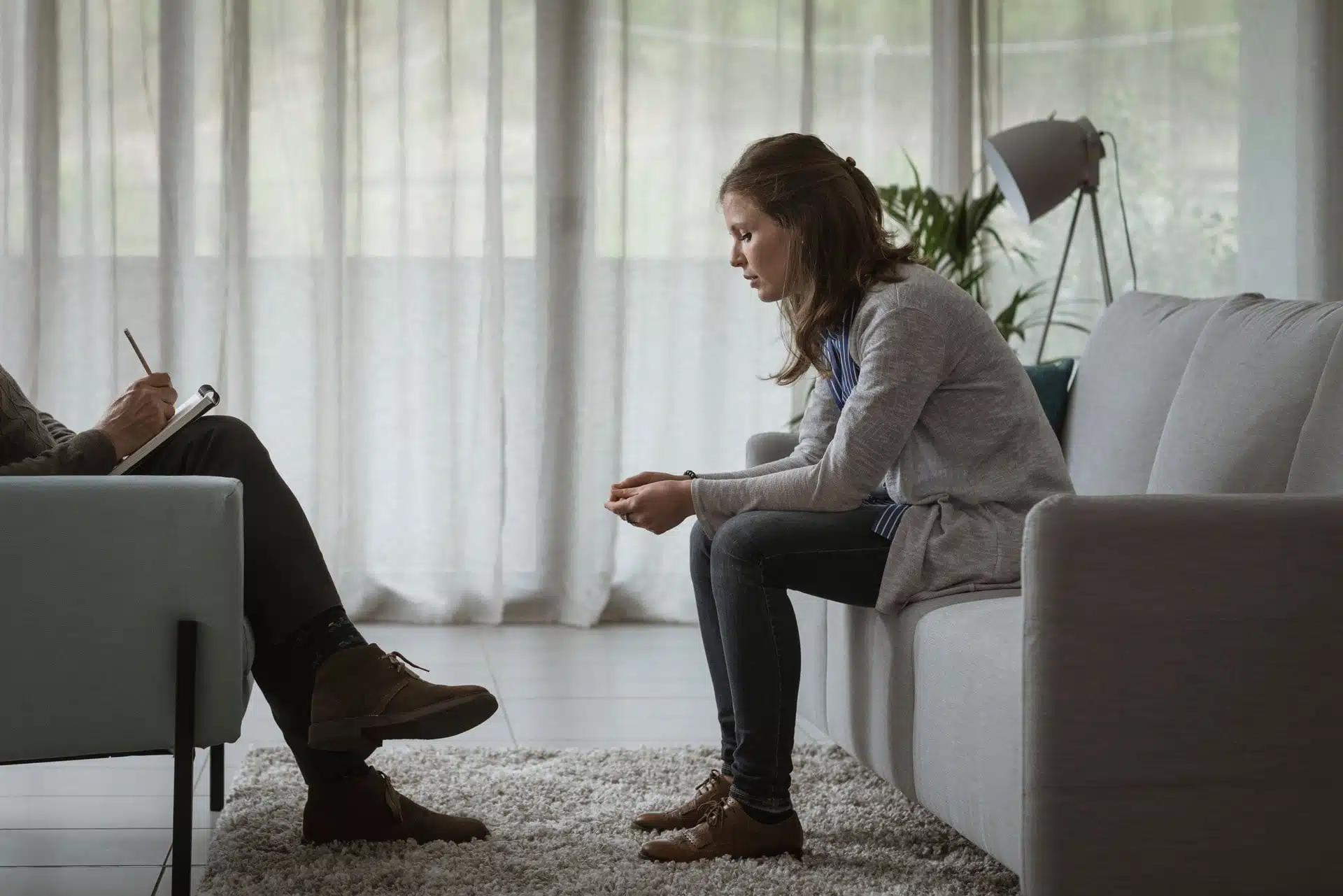Embarking on a journey toward healing is a testament to courage and strength. We honor your bravery in seeking support and guidance. Recognizing when we need help is a sign of incredible resilience—a first, vital step toward reclaiming the peace and balance you deserve. At Redeemed Life Counseling, we understand the weight of this decision and meet your courage with our commitment to nurturing a path of healing tailored just for you.
Nestled in the heart of Argyle, TX, Redeemed Life Counseling blends advanced therapeutic techniques with the warmth and personalized care that our community is known for. Our practice is more than just a place to talk; it’s a sanctuary where healing begins. Through a combination of innovative approaches to trauma therapy, we offer a beacon of hope for those navigating the complexities of healing from traumatic experiences. Whether you’re grappling with recent stressors or long-buried wounds, our therapists are here to guide you with expertise, empathy, and tailored strategies designed to foster profound, lasting transformation.
At Redeemed Life Counseling, we believe in the power of connection and the personalized approach to therapy. Let’s embark on this journey together, embracing the strength within you and the support around you, to find the peace and wholeness you deserve.
Why Choose Us for Your Trauma Therapy in Argyle, TX
Navigating trauma is deeply personal, and the path to healing is unique for each individual. Being situated in Argyle, TX, we understand the local context and culture which plays a vital role in our approach to therapy. We provide a comfortable setting amid familiar surroundings, making it a little easier to take that step towards seeking professional help.
Our team is comprised of highly qualified therapists who bring a rich tapestry of experiences and specializations to the table. Each of our team members has walked their path and carries their own personal stories of resilience and growth. They use these experiences, combined with professional knowledge, to provide empathetic and effective trauma therapy. Their compassionate support fosters trust, an essential catalyst in the healing process.
- Eye Movement Desensitization and Reprocessing (EMDR) and Cognitive Behavioral Therapy (CBT): EMDR has been shown to help trauma sufferers process and restructure traumatic memories effectively, while CBT helps individuals manage distressing thoughts and improve emotional regulation. The skilled integration of these therapies allows our therapists to tailor treatment to your unique needs, promoting more profound healing.
- Mindfulness-Based Therapies: By learning to stay present and strengthen the mind-body connection, you can manage symptoms, reduce stress, and foster self-compassion. We integrate mindfulness approaches into our treatment plans, enhancing mindfulness skills in authentic, personally relevant ways.
- Expressive Arts Therapy, Internal Family Systems (IFS) Therapy, Psychodrama, and Play Therapy: These therapies tap into the transformative power of self-expression, helping individuals communicate and process emotions they may not be able to verbalize. Our approach to these treatments is crafted uniquely for each individual, amplifying their voice and their healing process.
Our approach to trauma therapy is not a ‘one-size-fits-all’. We believe in blending therapeutic models to create a tailored approach, honoring your individual journey and steps to reclaim your life.
Understanding Trauma – Deep Dive Into Types and Symptoms
Trauma can manifest in many forms, influenced by a myriad of events and circumstances that deeply affect individuals. Understanding trauma is a complex task, as it can vary greatly from person to person. It’s not just the event itself that defines trauma, but also the individual’s emotional and psychological response to it.
Types of Trauma
- Acute Trauma: This results from a single distressing event, such as an accident or natural disaster. In Argyle, TX, where we are sometimes faced with intense weather events such as tornadoes, residents may experience acute trauma following such occurrences.
- Chronic Trauma: Repeated and prolonged exposure to highly stressful events can lead to chronic trauma. For example, individuals facing ongoing domestic violence or those in high-stress careers, such as first responders, may experience this type of trauma.
- Complex Trauma: A more intricate type of trauma, it arises from exposure to multiple traumatic events. It’s often interpersonal, involving a significant degree of betrayal, such as in the case of chronic child abuse.
- Secondary Trauma: Also known as vicarious trauma, this can impact those who help or empathize deeply with trauma victims, such as healthcare professionals or family members of individuals who have suffered trauma.
Symptoms of Trauma

Recognizing the symptoms of trauma is the first step to seeking treatment. These symptoms could be emotional, physical, psychological, or behavioral, including:
- Intrusive thoughts
- Emotional swings
- Anxiety and fear
- Feelings of numbness or detachment
- Physical symptoms like headaches and nausea
- Hyper-vigilance or exaggerated startle response
- Sleep disturbances
- Withdrawal from activities and relationships
For residents of Argyle, the tight-knit community dynamic means that local events can have a profound, shared impact – whether it’s a communal grief stemming from a local tragedy or a collective stress from economic pressures that might affect small-town business owners and workers.
The Impact and Effects of Trauma
Trauma can deeply affect an individual’s physical and psychological well-being, often leaving lasting and far-reaching implications. Physically, trauma can disrupt the body’s stress mechanisms, leading to chronic conditions such as heart disease or autoimmune disorders, or result in unexplained aches, fatigue and changes in brain chemistry and structure.
Emotionally and behaviorally, trauma can lead to conditions like Post-traumatic stress disorder (PTSD), depression, anxiety disorders, and impact personal relationships. Individuals may present behavioral changes such as substance misuse, social withdrawal, and self-destructive behavior. Cognitive changes, including difficulties with concentration, memory issues, and distortions of self-image or world perception, are also common.
Overall, trauma permeates into diverse aspects of daily life, compromising feelings of safety, occupational performance, and academic success. At Redeemed Life Counseling, we strive to understand the extensive impacts of trauma, tailor strategies to foster healing, and help clients build resilience against these effects.
Treatment Approaches
Our personalized treatment approaches cater to the specific nuances of each type of trauma:
- Acute Trauma: Rapid response interventions and coping strategies tailored to those affected by sudden events.
- Chronic Trauma: Long-term therapy modalities that may involve exploring past events to understand and heal ongoing trauma.
- Complex Trauma: Multi-faceted therapeutic techniques that address the multiple layers of complex trauma.
- Secondary Trauma: Support groups and therapy that provide healing spaces for caretakers and professionals continually exposed to traumatic situations.
At Redeemed Life Counseling, we recognize the unique challenges faced by residents of Argyle, TX. Our therapy services are not just about coping with symptoms, but also understanding the socio-economic and environmental factors that contribute to your experience of trauma. We create a safe space to explore these dimensions and cultivate resilience so that community members can not only recover but thrive.
Our Trauma Therapy Processes
Our therapists are trained to provide trauma-informed care that acknowledges the diversity of traumatic experiences. Whether you’ve faced a single traumatic event or endured prolonged stress, our team is here to guide you on your journey towards healing.
- Cognitive-Behavioral Therapy (CBT): Addressing negative thought patterns and behaviors to promote healthier coping mechanisms.
- Eye Movement Desensitization and Reprocessing (EMDR): A specialized approach proven effective in processing traumatic memories.
- Mindfulness-Based Therapies: Techniques that enhance present-moment awareness, promoting emotional regulation and stress reduction.
- Expressive Arts Therapy: Utilizing creative outlets to explore and process emotions, fostering healing through artistic expression.
- Brainspotting: An innovative therapeutic approach that targets and releases trauma held in the brain through the visual field, helping individuals process and overcome distressing experiences.
- Internal Family Systems (IFS) Therapy: A transformative model that explores the different facets of the self, helping individuals understand and integrate their internal dynamics for profound healing and self-discovery.
- Psychodrama: Engaging in dramatic enactment to explore and understand personal challenges, allowing individuals to gain insight and work through unresolved issues in a dynamic and experiential way.
- Play Therapy: Tailored for children, this approach uses play to help them express and process emotions, promoting healing in a developmentally appropriate and engaging manner.
- Experiential Therapies: Incorporating various hands-on and interactive techniques to encourage emotional expression, self-discovery, and personal growth.
Patient Resources
The Importance of Specialized Trauma Therapy
The journey of healing is deeply personal, and every individual’s path to recovery will look different. Because trauma’s effects can be so varied and profound, generalized therapy may not adequately address all aspects of an individual’s experience. This is where specialized trauma therapy comes in.
Specialized trauma therapy is particularly crucial as it provides a targeted approach to identifying, confronting, and healing traumatic experiences. It helps individuals navigate their own unique path through a complex emotional landscape, addressing the nuances that underlie their trauma experiences and responses.
Studies show that specialized trauma-focused therapies, such as EMDR and Trauma-Focused Cognitive Behavioral Therapy (TF-CBT), are significantly more effective for Post-Traumatic Stress Disorder (PTSD) symptoms than non-trauma-focused interventions. Therapies catered to trauma patients can help more effectively process traumatic events, manage symptoms, rebuild a sense of control and empowerment, and improve overall well-being.
Seeking Help – How to Get Started
Embarking on a journey of personal healing is an act of courage, and we are here to welcome you with compassion and confidentiality at every step. If you’re ready to start or even if you’re just contemplating therapy, we’ve made reaching out and booking a consultation with Redeemed Life Counseling a process grounded in understanding and support.
Easy Steps to Book Your Consultation:
1. Initial Contact
Reach out to us through our secure contact form available on our website or call us directly. Your confidentiality is our priority from the very first moment.
2. Consultation Scheduling
Reach out to us through our secure contact form available on our website or call us directly. Your confidentiality is our priority from the very first moment.
3. Personalized Support
During your consultation, you will be met with a listening ear and an open heart. Together, we'll explore your experiences and discuss how our specialized trauma therapy can help.
4. Begin Your Journey
Once you decide to proceed, we'll match you with the therapist best suited to your needs. Your path to healing will be ignited with the utmost care and discretion.
Reviews and Testimonials
FAQs About Trauma Therapy with RLC
Absolutely. We adhere strictly to confidentiality laws and best practices to ensure your privacy is always protected.
Session frequency is unique to each individual and their specific needs. This is something that will be discussed openly with your therapist and can be adjusted as therapy progresses.
FAQs About Trauma Treatment
Trauma therapy can be remarkably effective. Research has shown that trauma-focused therapies, like EMDR (Eye Movement Desensitization and Reprocessing) and TF-CBT (Trauma-focused Cognitive Behavioral Therapy), can significantly reduce or eliminate post-traumatic stress disorder (PTSD) symptoms.
Yes, we offer online therapy as an option for those who prefer it or have difficulties visiting in person for any reason. Online therapy can be just as effective and has the added convenience of being accessible from any location.
Yes, absolutely. Confidentiality is a cornerstone of any effective therapy, and we strictly adhere to professional ethical guidelines and legal requirements to protect your privacy.
Engaging with painful memories can indeed be challenging. However, our therapists are highly trained to guide you through this process in a safe, compassionate, and supportive environment. By facing these memories in therapy, you can begin to process and integrate them, reducing their power to cause distress.
You can get started by reaching out to us via our phone, email, or website contact form. We’ll arrange a consultation to discuss your needs and how we can support you in your journey to healing.

